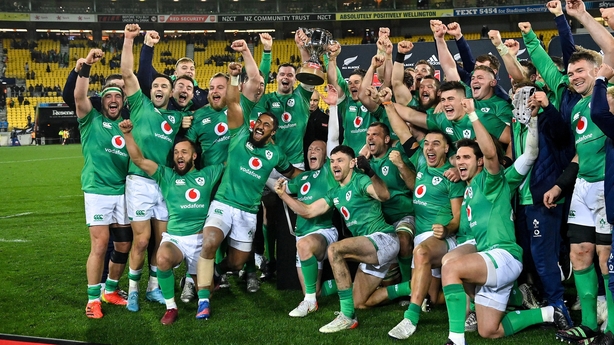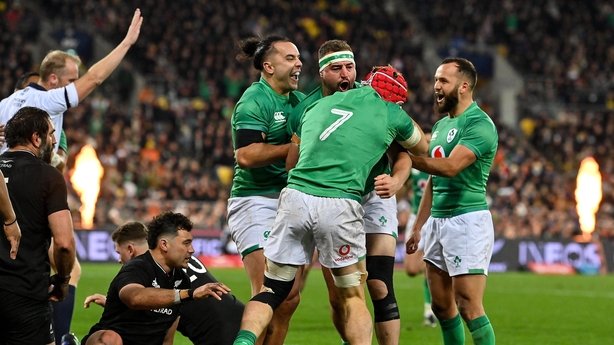In the week between Ireland's first and second ever wins against the All Blacks in New Zealand, a lot of questions were asked of Ireland.
Could they back it up against 15 All Blacks rather than 14? Could they run a lineout when Sam Whitelock is calling the shots? Could they stem the flow if and when New Zealand drew blood? Could they finally be clinical in the 22?
For pretty much every question that was asked of them last week, and in the three weeks previous, they replied with a resounding "Yes".
As always happens in the wake of a big win, the champagne has barely been corked before further questions are asked about where it ranks. It's a worthless answer when you don't know what the legacy is.
A more worthwhile ranking is to figure out where Saturday's 32-22 series clincher sits among the five (yes, five) wins against the All Blacks in recent years. In purely rugby terms, it's hard to argue against it being the most impressive.
With hindsight, we would admit the All Blacks weren't on the same pitch as Ireland in 2016, both mentally or physically, and the job they did in the return in Dublin a fortnight later showed it.
In 2018 Ireland beat them into submission. By far the best team, but the rugby was more methodical than mesmerising.
Last year, Ireland ran the All Blacks off the pitch. It was rock and roll rugby, the kind of no team could live with, but while Ireland dominated the game their wastefulness in the 22 could have haunted them on another day. Last week's win in Dunedin was a similar story.

Saturday's win in Wellington was the complete package. Given Ireland had levelled the series a week earlier, and there was a cloud of pressure hanging over Ian Foster, there can be no suggestion the hosts weren't as dialed in as the tourists. Given they had loaded their lineout with the returning Sam Whitelock, David Havili, Nepo Laulala and Will Jordan, their intentions were clear.
Just like the first two Tests, Ireland started hot with a try inside the opening minutes, but unlike the first two Tests, they spent the bulk of the first half defending. Their patience never waned, and when they had the opportunity to attack late in the half they swarmed on it.
In the final few minutes of the first half, they elicited one of the game's rarities: a panicked All Blacks. A score has never felt as inevitable as Robbie Henshaw's just before half time. It was a first half that was blood-chilling and heartwarming in equal measure.
The next sense of inevitability came when the All Blacks started gathering moss. From 22-3 to 25-22 in the space of 20 minutes, Ireland were bleeding, but their ability to stem the flow when New Zealand were in full flow brought this win to the next level.
The only question they are yet to answer is one they can't answer for another 15 months. What about the World Cup?
They're acutely aware that every success and failure they have is viewed through that World Cup prism.
Within moments of full time, Johnny Sexton was mentioning it.
"I know in a year's time when the Word Cup starts it won't mean anything as we learned before," he said pitchside.
"We'll certainly enjoy tonight - and then maybe a couple of more days and then we've got to keep improving. That's what we have to learn from previous years, we have to keep improving."
In the last year, Sexton, Farrell and co have embraced the big picture while not losing sight of the here-and-now.
There have been enough lessons to be learned, 2007 and 2019 spring to mind, but this time it feels like they're better placed to build on their success, rather than settling on it.

The biggest reason for that is France.
When Ireland wore the All Blacks into the ground in 2018, they were the consensus Best Team in the World, even if the world rankings didn't say so. They'd dominated the Six Nations, beaten Australia down under in a Test series, before going on to strangle the world champions. They were the team to beat.
And although Saturday's series finale has seen them overtake France at the top of the world rankings, the scales would likely be weighed in favour of the Six Nations champions were the sides to play each other tomorrow morning.
And with the path to a World Cup semi-final and final known long in advance, we already know that if Ireland are to break new ground in 2023, they'll have to beat one of France or New Zealand in order to reach the last four.
In recent meetings, Ireland have struggled with Fabien Galthie's Six Nations champions, particularly at the scrum and lineout, two areas of the Irish game that still need long term fixes over the course of the four-year cycle.
It's also unlikely that France have reached their summit, with Galthie using this summer's tour to Japan as an opportunity to rest of big hitters and develop his wider squad.
The prospect of France being even better is a daunting one, but it also does more than enough to sharpen the mind.


